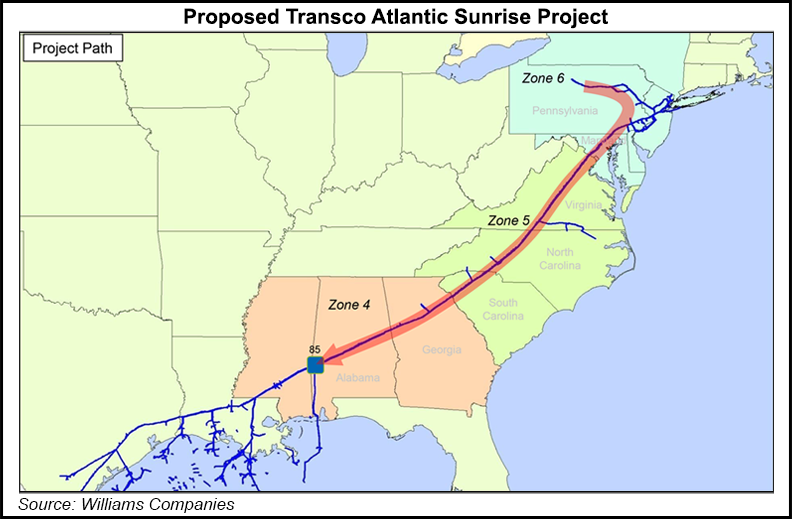Regulatory | Infrastructure | NGI The Weekly Gas Market Report
Atlantic Sunrise FEIS A Belated Gift For Williams Partners, Cabot
Marcellus Shale producer Cabot Oil & Gas Corp. got a Christmas wish granted a few days late by FERC staff, which on Friday released a long-awaited final environmental impact statement for Williams Partners’ Atlantic Sunrise project.

A final decision on the project by the Federal Energy Regulatory Commission is now expected in early 2017 [CP15-138]. With approval, construction could begin in mid-2017 with partial in-service during the second half of that year and full in-service expected in mid-2018.
“Today’s final EIS issuance represents a major milestone toward the final approval of the Atlantic Sunrise project,” said Cabot CEO Dan O. Dinges.
Houston-based Cabot had previously committed to move 850,000 MMBtu/d on the project in support of previously announced gas sales agreements. On Friday Cabot said it was increasing its capacity commitment on the project by 150,000 MMBtu/d in support of another sales agreement.
“We are also excited to increase our committed sales on the Atlantic Sunrise project utilizing capacity subscribed to by Cabot or by third parties to approximately 1 Bcf/d through the addition of this new sales agreement that is linked to the Gulf Coast market,” Dinges said.
The roughly $3 billion Atlantic Sunrise would open a path for constrained Marcellus Shale gas to reach markets in the Southeast through the Transcontinental Gas Pipe Line Co. LLC (Transco) system running along the Atlantic seaboard. The expansion would include about 197.7 miles of pipeline composed of about 184 miles of new 30- and 42-inch diameter pipeline for the greenfield CPL North and CPL South segments in Pennsylvania; about 12 miles of new 36- and 42-inch diameter pipeline looping known as Chapman and Unity Loops in Pennsylvania; about three miles of 30-inch diameter replacements in Virginia; and associated compressor stations, equipment and facilities.
Late last October Williams Partners confirmed that the project would be delayed because of the revision of its environmental review schedule at the Commission. Friday’s FEIS announcement elicited praise from the company.
“While we are still analyzing its full contents, we believe the thoroughness of this document underscores our collaborative efforts to design the Atlantic Sunrise project in a manner that minimizes environmental impacts, while fulfilling the critical need of connecting consumers all along the East Coast with abundant, cost-effective Pennsylvania natural gas supplies by leveraging our existing Transco pipeline infrastructure,” Williams Partners spokesman Chris Stockton said.
In the FEIS FERC staff found that with Transco’s proposed and staff-recommended mitigation measures, the project should go forward.
“We determined that construction and operation of the project would result in some adverse environmental impacts, but impacts would be reduced to less-than-significant levels with the implementation of Transco’s proposed and our recommended mitigation measures,” staff said. “This determination is based on a review of the information provided by Transco and further developed from data requests; field investigations; scoping; literature research; alternatives analysis; and contacts with federal, state, and local agencies as well as tribes and individual members of the public.”
Also on Friday, FERC staff issued a draft environmental impact statement for the Atlantic Coast Pipeline LLC and related Supply Header Project, which target Appalachian basin gas supplies to serve southeastern U.S. power generation demand.
© 2024 Natural Gas Intelligence. All rights reserved.
ISSN © 1532-1231 | ISSN © 1532-1266 |
